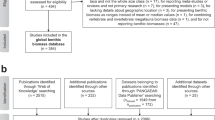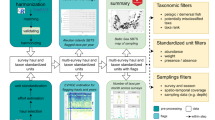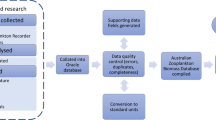Abstract
IN ecological work it is often necessary to have comparative estimates of the numbers of organisms in a large number of samples. An exact valuation may not be required, but an approximate numerical estimate is always preferable to statements in such terms as few, many, very many, etc. The following method was devised to furnish estimates rapidly and without counting of the numbers of a few of the more important species of the marine plankton where only one or two such species formed the bulk of the samples and where an estimation within ±15 per cent of the actual numbers would be sufficient. Actually the plankton is as a rule so mixed that the method can only be applied to special series of samples and not to normal survey work. It is thought, however, that the method, which is believed to be new, may be of value to workers in other fields: perhaps for estimating the seed production of a large number of plants or samples of small insects all of one species.
This is a preview of subscription content, access via your institution
Access options
Subscribe to this journal
Receive 51 print issues and online access
$199.00 per year
only $3.90 per issue
Buy this article
- Purchase on Springer Link
- Instant access to full article PDF
Prices may be subject to local taxes which are calculated during checkout
Similar content being viewed by others
Author information
Authors and Affiliations
Rights and permissions
About this article
Cite this article
HARDY, A. Estimating Numbers Without Counting. Nature 142, 255–256 (1938). https://doi.org/10.1038/142255b0
Published:
Issue Date:
DOI: https://doi.org/10.1038/142255b0
Comments
By submitting a comment you agree to abide by our Terms and Community Guidelines. If you find something abusive or that does not comply with our terms or guidelines please flag it as inappropriate.



